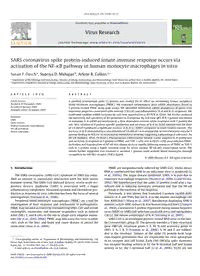
2009 SARS coronavirus spike protein-induced innate immune response occurs via activation of the NF-_B pathway in human m PDF
Preview 2009 SARS coronavirus spike protein-induced innate immune response occurs via activation of the NF-_B pathway in human m
Virus Research 142 (2009) 19–27 Contents lists available at ScienceDirect Virus Research journal homepage: www.elsevier.com/locate/virusres SARS coronavirus spike protein-induced innate immune response occurs via activation of the NF-�B pathway in human monocyte macrophages in vitro Susan F. Dosch a, Supriya D. Mahajan b, Arlene R. Collins a,∗ a Department of Microbiology and Immunology, Division of Allergy, Immunology and Rheumatology, State University of New York at Buffalo, Buffalo, NY, United States b Department of Medicine, Division of Allergy, Immunology and Rheumatology, State University of New York at Buffalo, Buffalo, NY, United States a r t i c l e i n f o Article history: Received 28 November 2008 Accepted 9 January 2009 Available online 29 January 2009 Keywords: SARS Spike protein Human monocyte macrophages NF-�B activation Innate immunity a b s t r a c t A purified recombinant spike (S) protein was studied for its effect on stimulating human peripheral blood monocyte macrophages (PBMC). We examined inflammatory gene mRNA abundances found in S protein-treated PBMC using gene arrays. We identified differential mRNA abundances of genes with functional properties associated with antiviral (CXCL10) and inflammatory (IL-6 and IL-8) responses. We confirmed cytokine mRNA increases by real-time quantitative(q) RT-PCR or ELISA. We further analyzed the sensitivity and specificity of the prominent IL-8 response. By real-time qRT-PCR, S protein was shown to stimulate IL-8 mRNA accumulation in a dose dependent manner while treatment with E protein did not. Also, titration of S protein-specific production and secretion of IL-8 by ELISA showed that the dose of 5.6 nM of S produced a significant increase in IL-8 (p = 0.003) compared to mock-treated controls. The increase in IL-8 stimulated by a concentration of 5.6 nM of S was comparable to concentrations seen for S protein binding to ACE2 or to neutralizing monoclonal antibody suggesting a physiological relevance. An NF-�B inhibitor, TPCK (N-Tosyl-L-Phenylalanine Chloromethyl Ketone) could suppress IL-8 production and secretion in response to S protein in PBMC and THP-1 cells and in HCoV-229E virus-infected PBMC. Activation and translocation of NF-�B was shown to occur rapidly following exposure of PBMC or THP-1 cells to S protein using a highly sensitive assay for active nuclear NF-�B p65 transcription factor. The results further suggested that released or secreted S protein could activate blood monocytes through recognition by toll-like receptor (TLR)2 ligand. © 2009 Elsevier B.V. All rights reserved. 1. Introduction The SARS coronavirus (SARS-CoV) epidemic of 2003 has rekin- dled an interest in coronavirus interaction with the host innate immune system. The SARS-CoV-induced disease, severe acute res- piratory distress syndrome (SARS) is associated with a major inflammatory component. Increased cytokine and chemokine pro- duction in response to virus infection has been the focus of several investigations (Frieman et al., 2008). Peripheral blood monocyte macrophages (PBMC) are a tool for investigation of host response and mechanism of pathogenesis. PBMC may become activated by encountering SARS-CoV and recruit neutrophils, monocytes and immune responders such as natural killer (NK), T, and B cells to the site to shape early adaptive immu- nity (He et al., 2003, 2006). PBMC may also carry the virus to other sites such as the liver and brain and cause disease or persist for some time (Shao et al., 2006). ∗ Corresponding author at: Department of Microbiology and Immunology, 138 Farber Hall, State University of New York at Buffalo, Buffalo NY 14214-3000, United States. Tel.: +1 716 829 2161; fax: +1 716 829 2158. E-mail address:
